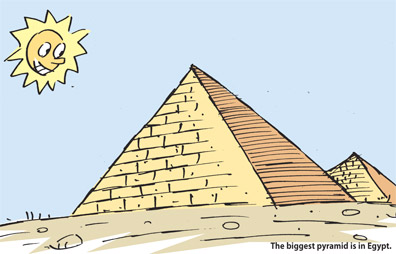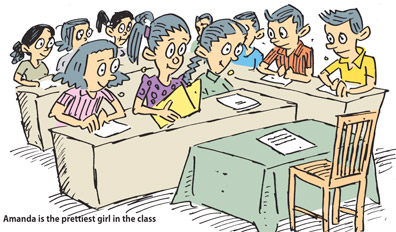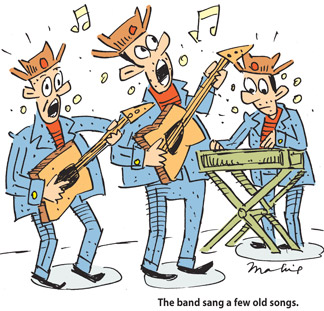|

by R. S. Karunaratne
The comparison of adjectives
We form the comparative and superlative forms of short (one syllable)
adjectives by adding 'er' and 'est' to the positive form.
Positive Comparative Superlative
 Cheap cheaper cheapest Cheap cheaper cheapest
Small smaller smallest
Nice nicer nicest
Big bigger biggest
Happy happier happiest
Busy busier busiest
Dirty dirtier dirtiest
Funny funnier funniest
Heavy heavier heaviest
Lovely lovelier loveliest
Pretty prettier prettiest
Silly sillier silliest
Tidy tidier tidiest
Amanda is the prettiest girl in the class
The biggest pyramid is in Egypt.
We use 'more' and 'most' before adjectives ending in 'ed' to make the
comparative and superlative forms.
Positive Comparative Superlative
Pleased more pleased most pleased
Tired more tired most tired
Learned more learned most learned
Educated more educated most educated
Annoyed more annoyed most annoyed
We use 'more' and 'most' before adjectives ending in 'ful' or 'less'
to make the comparative and superlative forms.
Careful more careful most careful
Helpful more helpful most helpful
Useful more useful most useful
Hopeless more hopeless most hopeless
We use 'more' and 'most before adjectives ending in 'ing' to make the
comparative and superlative forms.
Positive Comparative Superlative
Boring more boring most boring
Willing more willing most willing
We use 'more' and 'most' before many other adjectives to make the
comparative and superlative forms.
Positive Comparative Superlative
 Afraid more afraid most afraid Afraid more afraid most afraid
Certain more certain most certain
Eager more eager most eager
Famous more famous most famous
Foolish more foolish most foolish
Frequent more frequent most frequent
Modern more modern most modern
Nervous more nervous most nervous
Irregular forms
Positive Comparative Superlative
Good better best
Bad worse worst
Far farther/further farthest/furthest
[Activity]
Fill in the blanks with the superlative form of the adjectives given
in brackets. Check your answers with the key.
1. Anula is the ............... (beautiful) girl in my class.
2. Today is the .............. (short) day of the year.
3. That was the ............. (funny) film I've ever seen.
4. It was the .............. (horrible) feeling I ever had.
5. Romax is the ........... (large) company in the country.
6. Have you read Anne's the .............. (recent) book?
7. His was the ............... (boring) speech I've ever heard.
8. That's the ............... (helpful) idea so far.
9. They use the ............... (modern) production methods.
10. This is the ................ (early) I've ever got up.
Key:
1. most beautiful 2. shortest 3. funniest 4. most horrible 5. largest
6. most recent 7. most boring 8. most helpful 9. most modern 10.
earliest
Starters:
Know your punctuation marks
The following punctuation marks are used in English.
. Full stop
? Question mark
! Exclamatory mark
; Semi-colon
: Colon
- Dash
, comma
``..." Quotation marks
` Hyphen
' Apostrophe
Capital letters
Full stop ( . )
 We use a full stop at the end of a sentence. We use a full stop at the end of a sentence.
I want to avoid hurting anyone's feelings.
I can't wait to see the photos you took.
I'm afraid I've got no money.
The band sang a few old songs.
Emma reminded me about my appointment.
Question mark ( ? )
We use a question mark at the end of a question.
Who are you?
Did you consult the doctor?
Could you wait here, please?
Let's eat out, shall we?
Shall we play tennis?
Exclamation mark ( ! )
We use an exclamation mark immediately after an exclamation.
Rubbish! he said in disgust.
Oh, no! I don't believe it!
What a terrible fire is this!
Long live the king!
Oh dear!
Semi-colon ( ; )
We use a semi-colon between two separate statements which are linked
in meaning.
It represents a pause of greater importance than that shown by the
comma.
Malini is a very kind woman; she visits her husband in hospital every
day.
Sando was a brave man; and we all admired him.
Today we love what tomorrow we hate; today we seek what tomorrow we
shun; today we desire what tomorrow we fear.
Some people work best in the mornings; others do better in the evenings.
It's a fine idea; let's hope that it is going to work.
Colon ( : )
We use a colon before an explanation or a list of items.
Sam felt nervous: he hated the dark.
There wasn't much in the refrigerator: some butter, a bunch of grapes, a
bottle of jam and some soft drinks.
The principal part of a verb in English are: the present tense, the past
tense and the past participle.
Study logic to know how to argue: no study is more important.
I decided not to go on holiday: I had very little money.
Dash ( - )
We use a dash instead of a colon or semi-colon. Dashes are common in
informal writing.
I can never remember - names, faces and telephone numbers.
We had a great time in Japan - the children really loved it.
My father - who rarely loses his temper - really lost his cool.
And then we met the super star - with all my friends.
I'll be arriving during the vacation - at least, I think so.
Comma ( , )
We use a comma when we join two statements with 'and, but' or 'or.'
I was tired, and my feet were hurting.
She saw a really good mobile phone, but she couldn't afford to buy it.
We decided to try the home-made rice and curry, and father ordered
Chinese food.
Mary had very little money, but she never dreamed of borrowing.
We use commas between adjectives.
The athlete was tall, dark and handsome.
The city was full of concrete, glass and plastic buildings.
We use commas when a sentence has linking words such as 'when' or
'although'.
When the bank has a lot of business, I have to work late.
Quotation marks ( "..." )
We put direct speech within quotation marks, also known as "Speech
marks" and "Inverted commas."
Gamini said, "You haven't closed the gate."
``I haven't had time to do it," he said.
We put quotation marks around titles of books, films and plays.
I watched "The Titanic" for the third time.
We are going to see "Maname" this evening.
We use quotation marks when we mention a word or phrase.
What does "rendezvous" mean?
Hyphen ( - )
We use a hyphen with compound nouns.
I would like to have an ice cream.
I'm not interested in rock-climbing.
Her father is an Attorney-at-Law.
Apostrophe ( ' )
We use an apostrophe in contracted words.
I didn't do it.
They haven't come.
Capital letters
We use capital letters at the beginning of a sentence.
The Mahaweli is the longest river in Sri Lanka.
We also use capital letters to begin the name of people, places and
companies.
Prime Minister S. W. R. D. Bandaranaike was assassinated.
Sri Jayewardenepura is the capital of Sri Lanka.
I bought my car from Colonial Motors.
Form adjectives from nouns
Words come in families. You can expand your vocabulary by becoming
familiar with these word families. In the following quiz we give you 25
nouns in column 'A' for which you have to write the relevant adjectives
in column 'B'. Check your answers with the key.
Column A
Column B
1. Trouble .............
2. Trust .............
3. Truth .............
4. Try .............
5. Turn .............
6. Twist .............
7. Type .............
8. Understanding .............
9. Upset .............
10. Urgency .............
11. Use .............
12. Value .............
13. Variety .............
14. Vegetable .............
15. Violence .............
16. Want .............
17. War .............
18. Warmth .............
19. Wash .............
20. Wastage .............
21. Watch .............
22. Water .............
23. Way .............
24. Weakness .............
25. Wear .............
Key:
1. troublesome 2. trustworthy 3. true 4. trying 5. upturned 6.
twisted 7. typical 8. understandable 9. upset 10. urgent 11. useful 12.
valuable 13. various 14. vegetarian 15. violent 16. wanted 17. warlike
18. warm 19. washable 20. waste 21. watchful 22. watery 23. wayward 24.
weak 25. worn |


